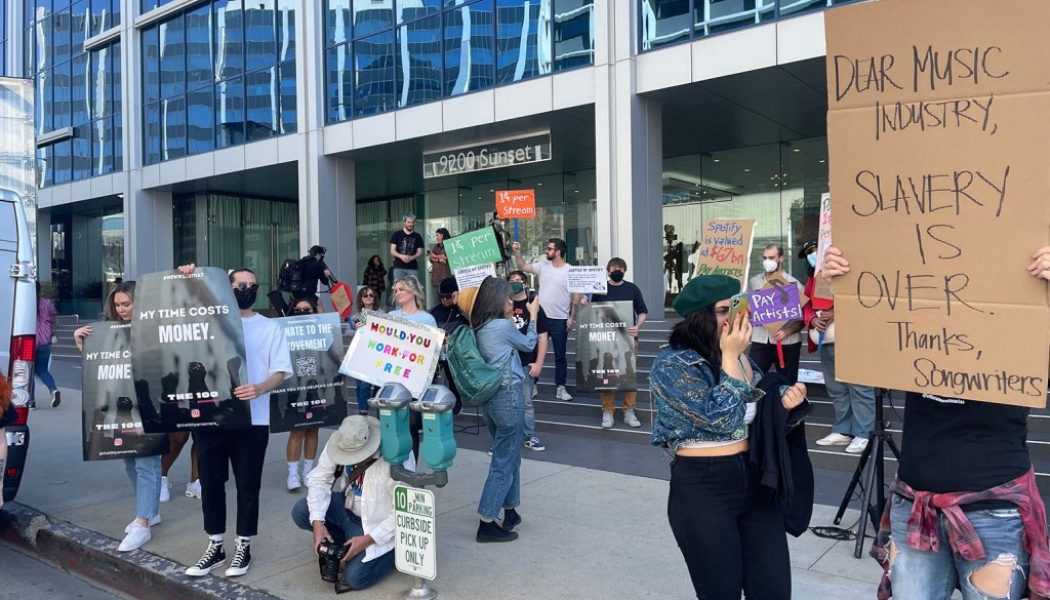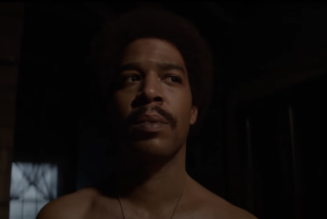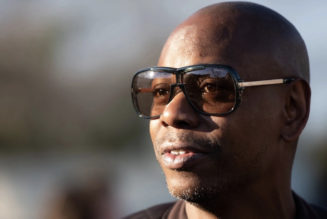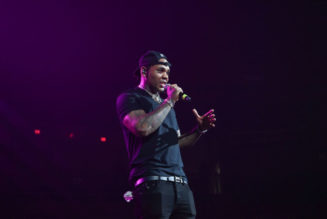
A group of songwriters led by the organization The 100 Percenters gathered outside of Spotify’s old West Hollywood office Monday afternoon (Feb. 28) to protest the streaming service’s low royalty rates. Dubbed “#WeWroteThat,” the collection of creatives began congregating around noon while holding signs with phrases like “My time costs money,” “Would you work for free?,” “Spotify is valued at $67 billion — pay artists” and “1 cent per stream.”
Event organizer Tiffany Red — a professional songwriter and founder of The 100 Percenters who has credits on songs performed by Jennifer Hudson, Jason Derulo and more — says the protest at 9200 Sunset Blvd. (a building Spotify previously occupied before moving to its current headquarters in Downtown Los Angeles’ Arts District in 2018) was motivated by a myriad of grievances she has with streaming services and Spotify in particular, including the company’s fight against increasing the royalty rates songwriters and publishers are paid per stream.
Monday’s protest is part of a larger ongoing battle over the royalties paid by services like Spotify, Apple Music, Amazon and Pandora. In Oct. 2021, the National Music Publishers’ Association asked the Copyright Royalty Board, which determines the streaming royalty rates for periods of five years, for a 32.4% increase in the headline rate to 20% of a digital service’s revenue for the full five-year term for Phonorecords IV (a period covering 2023-2027). By contrast, Spotify, Pandora and Amazon proposed lower rates for songwriters and publishers in Phono IV than in any year since 2018.
Another major pain point for songwriters is that they’re still being compensated according to the rate set in Phono II (2013-2017) while awaiting a final ruling on an appeal — filed by Spotify, Amazon Music, Pandora and YouTube — of the CRB’s rate hike for Phono III (2018-2022), which would have led to higher payouts.
Other protestors point to Joe Rogan‘s more than $200 million deal to host his podcast, The Joe Rogan Experience, on Spotify exclusively as an impetus for the protest. “They tell us they can’t pay us more and then they go and give a podcaster that much money?” says Bianca “Blush” Atterberry, an artist and songwriter who has written for artists including Demi Lovato, Meghan Trainor and Chris Brown and is also a member of The 100 Percenters board. “If we didn’t exist, making the music, neither would Spotify.”
Rogan’s recent scandals — including the spread of COVID-19 vaccine misinformation and his repeated use of the N-word on the podcast — have recently sparked criticism among several prominent musicians. Some, like Neil Young, Joni Mitchell, David Crosby and India.Arie, have left the platform in protest. Red says that Arie’s criticism of Spotify’s low royalty payouts specifically was a major factor in spearheading The 100 Percenter’s protest.
“When India.Arie started to speak out about how the artists and songwriters are paid, I realized that now the fight against Spotify is coming into everybody’s living rooms, and it’s important for us to get out there and show our face,” says Red.
When asked why The 100 Percenters chose the site of Spotify’s former office, Red replied, “Because we wanted to start where they started. Our next in-person event will be going to where they are now in Downtown.” She points to how the company upgraded from the significantly smaller West Hollywood location to their new sprawling Arts District campus as a sign of the company’s wealth. “They were able to make that move easily and comfortably,” she says.
Rogan and Spotify aside, the #WeWroteThat protest comes down to the fight for better pay for working creatives overall. “I just want to be able to pay my bills. I just want to afford basic expenses. We songwriters struggle every day,” says Kaydence, a songwriter and board member of The 100 Percenters. “I’ve written for some of the biggest artists in the world, like Ariana [Grande] and Beyonce, and it’s still hard.”
“We give our all to make music and then we watch as other people make millions and billions off it,” adds Caso, another professional songwriter who was at the protest. “People see the credits of the song and they think dollar signs, but the reality is different.”
[flexi-common-toolbar] [flexi-form class=”flexi_form_style” title=”Submit to Flexi” name=”my_form” ajax=”true”][flexi-form-tag type=”post_title” class=”fl-input” title=”Title” value=”” required=”true”][flexi-form-tag type=”category” title=”Select category”][flexi-form-tag type=”tag” title=”Insert tag”][flexi-form-tag type=”article” class=”fl-textarea” title=”Description” ][flexi-form-tag type=”file” title=”Select file” required=”true”][flexi-form-tag type=”submit” name=”submit” value=”Submit Now”] [/flexi-form]










Tagged: business, entertainment blog, music blog, Publishing, songwriters, Spotify, The 100 Percenters